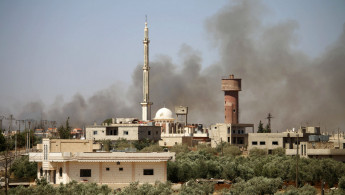Air strikes kill five as southern Syria assault looms
Russian-backed regime forces have for weeks been preparing an offensive to retake Syria's south, a strategic zone that borders both Jordan and the Israeli-occupied Golan Heights.
The regime has sent military reinforcements to the area, dropped flyers demanding rebels surrender, and ramped up air strikes in recent days.
Late Saturday, President Bashar al-Assad's Russian allies began bombing the rebel-held south for the first time since summer 2017, said the Syrian Observatory for Human Rights.
The Russian raids continued into Sunday.
"Five civilians including two women were killed on Sunday in Russian strikes on the towns of Al-Herak, Al-Sura, and Alma," said Observatory chief Rami Abdel Rahman.
He said the raids had damaged two hospitals and forced medical staff to shut them down temporarily.
The three rebel-held towns are located in Daraa province, known widely as the cradle of Syria's seven-year uprising.
Daraa and the adjacent province of Quneitra are mostly held by opposition forces, while the government controls most of the province of Sweida to the east.
Assad has repeatedly pledged to retake all of Syria, but key parts of the south fall under a "de-escalation zone" agreed by Russia, the US and Jordan in July 2017.
Since then, Moscow's air force - active in Syria since 2015 - had refrained from bombing the south.
Israel fires at drone
But violence began ratcheting up last Tuesday and has since left 25 civilians dead in regime and Russian bombardment on southern rebel zones, the Observatory said.
Rebels have returned fire into government territory, killing a girl in Sweida province and wounding three people in the provincial capital of the same name on Sunday, state news agency SANA said.
Escalating bombardment has displaced some 17,000 people from rebel towns in Daraa's eastern countryside, according to the Observatory.
Many have sought refuge in poorly-resourced displacement camps further west or close to Syria's border with Jordan, with little access to food or water.
They have few other options, with Jordan saying on Sunday it could not accept any more than the 650,000 Syrian refugees it is already hosting.
"Jordan has not and will not abandon its humanitarian role and its commitment to international charters, but it has exceeded its ability to absorb (more refugees)," Jumana Ghanimat, minister of state for media affairs, told AFP.
The United Nations has warned that renewed hostilities could put 750,000 lives at risk.
In an effort to avoid a deadly offensive, the US, Russia and Jordan are holding talks aimed at reaching a negotiated settlement for Syria's south.
Any deal, analysts say, would have to take into consideration Israel's opposition to its arch-foe Iran entrenching itself in southern Syria.
On Sunday, the Israeli air force said it fired a Patriot missile at a drone approaching its northern border from Syria, forcing it to turn back.
'You're on your own'
Assad has acknowledged negotiations over the south, but warned that if they failed, his troops would have "no choice" but to retake the area by force.
His troops have already recaptured two "de-escalation zones" this year: Eastern Ghouta outside Damascus and parts of the central Homs province.
They have seized four villages in the south so far, leaving 13 regime forces and 15 rebels dead, according to the Observatory.
Many of those rebels have previously received backing from Jordan and the US, but Washington has urged them not to expect American help should the regime start a new assault.
The US warning was contained in an Arabic-language message distributed to rebel commanders and seen by AFP.
"We must clarify our position: we understand that you must make a decision (to fight) based on your interests, the interests of your people and your faction as you see them," the message read.
"You should not base your decision on an assumption or expectation of military intervention from our side."
The US did not immediately confirm the letter's contents.
One opposition commander in the south who received the letter said it did not surprise him.
"The letter's contents mean that America will not be able to help the south - in other words, they are saying 'you're on your own,'" he told AFP.





 Follow the Middle East's top stories in English at The New Arab on Google News
Follow the Middle East's top stories in English at The New Arab on Google News
![Israeli forces ordered bombed Gaza's Jabalia, ordering residents to leave [Getty]](/sites/default/files/styles/image_330x185/public/2176418030.jpeg?h=a5f2f23a&itok=_YGZaP1z)

